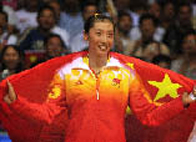After Gold, What's Next?
Chinese Athletes in Retirement
When Chinese badminton player Zhang Ning won gold for a second time in the women's singles at the Beijing Olympics, she knelt on the ground and cried. Tears were still running down her cheeks when she mounted the podium. No doubt this was partly because the victory was also a farewell: soon after successfully defending the Olympic championship, the 33-year-old Zhang announced her retirement, bringing her 23-year badminton career to an end.
|

|
| Li Ning celebrating Olympic victories with the Chinese Gymnastics Team on August 21, 2008 |
Zhang Ning is one of a large number of Chinese athletes who retired after the Beijing Olympics. Many held on so they could compete on home soil, regarding the event as a fitting end to their sporting careers. A few will continue only until the National Games next year. At this moment, they are all facing the question that confronts every athlete when their sporting careers are over: what to do next?
As China's economy continues to grow, more and more retired athletes move into fields like business and entertainment. Obtaining work through administrative order and being appointed to a position such as a coach is not as easy as in the days of the planned economy, so the majority seek employment in the private sector. Accordingly, athletes' post-sporting lives are becoming increasingly colorful.
Raking in the Millions
During the opening ceremony of the Beijing Olympics on August 8, Li Ning, the former Chinese male gymnast who won three gold medals at the 1984 Los Angeles Olympics, galloped along the rim of the "Bird's Nest" and lighted the Olympic flame in front of a TV audience of millions. Before he retired at the end of 1988, Li won over 100 gold medals in various competitions, becoming widely known in China as the "gymnastics prince." He now owns the sportswear manufacturing giant Li Ning Co., Ltd. with a market value of US $1.8 billion, making him the "business tycoon" of China's former athletes.
Although he was the most successful male gymnast in Chinese history, Li Ning faced a dilemma when he retired in December 1988. In September that year, he abruptly fell from the summit of the gymnastics world when he made several errors during the Seoul Olympics. He subsequently suffered piercing sarcasm upon his return home.
China was still under a planned economy at the end of 1980s, and retired sporting stars obeyed administrative orders, generally becoming coaches or sports officials. Surprisingly Li Ning made a different choice. He was determined to go into business. He became the special assistant to the general manager of the Jianlibao Group in 1989, and a year later established his sportswear company.
After nearly two decades Li Ning has become a leading sports brand in China, and Li Ning himself now ranks as one of the country's richest people. His lighting of the Olympic flame on August 8 is said to have been an enormously successful advertisement for his company, which will no doubt considerably increase the popularity of his brand.
Li's success in business has provided a model for other retired athletes, and has made star players realize their commercial value. As the market economy was gradually established in China during the 1990s, increasing numbers of retired athletes opted to go into business. The most common route is to set up sports clubs or sporting goods companies. Famous brand names now include the company named after Li Xiaoshuang, winner of the men's all-around artistic gymnastics at the 1996 Atlanta Olympics, and the sports and cultural development company created by Lou Yun, gold medalist in the men's horse-vaulting at the 1988 Seoul Olympics.
Moreover, Yang Xi, a member of the Chinese Women's Volleyball Team that won the world championships in 1981 and 1982, went on to become a property developer. Yang's personal assets have swelled to over RMB 100 million, putting her in the same league as Li Ning. Zhuang Yong, the champion of the women's 100m freestyle at 1992 Barcelona Olympics, manages a media company. Her teammate Yang Wenyi, who won the women's 50m freestyle at the same Games, set up a sports communication company and a swimming club.
The Political Path
During the Beijing Olympics, Deng Yaping, winner of both the women's table tennis singles and doubles for two successive Olympics, frequented various news conferences. As the deputy head of the Olympic Village Department, she was one of a few retired athletes to take up an official post with BOCOG (Beijing Organizing Committee for the Games of XXIX Olympiad).
Compared to older generations of retired athletes, Deng Yaping is not the highest in official rank, but her brilliant school record and high degree of internationalization set her apart from others. Besides being appointed as the deputy head of the Olympic Village Department in March 2007, Deng is a member of the International Olympic Committee Athletes Commission and a member of the National Committee of the Chinese People's Political Consultative Conference.
| 